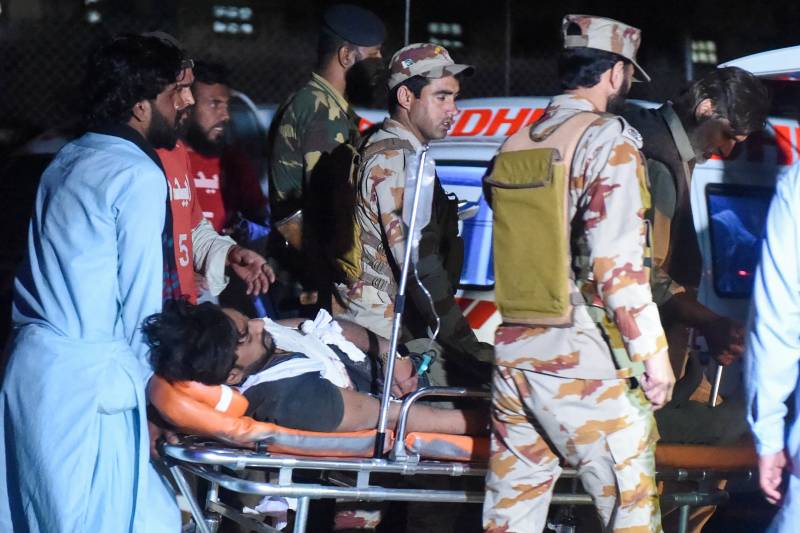Terrorism to Suppress: Jaffar Express

Stay tuned with 24 News HD Android App

The recent attack on Jaffar Express in Balochistan has once again highlighted the persistent threat of terrorism in Pakistan. The incident, which involved the brutal execution of 21 innocent passengers and a daring hostage rescue operation by security forces, underscores the complex security challenges facing the country. While the swift and effective response of the Pakistan Army, Special Services Group (SSG), and Frontier Corps (FC) averted further catastrophe, the attack raises critical questions about Pakistan’s internal security, cross-border terrorism, and the evolving nature of militant threats.
On March 11, terrorists targeted a railway track in Bolan, forcing Jaffar Express to a halt and taking passengers hostage. The militants, affiliated with the Baloch Liberation Army (BLA), used innocent civilians—including women and children—as human shields, complicating any immediate counter-terrorism response. According to Inter-Services Public Relations (ISPR), the terrorists remained in direct communication with their handlers in Afghanistan via satellite phones, indicating a well-coordinated and externally supported plan.
The response from Pakistan’s security forces was swift and decisive. The complex operation involved snipers neutralizing suicide bombers, followed by a coach-by-coach clearance. Ultimately, all 33 terrorists were eliminated, and hostages were freed without additional loss of civilian life during the operation. However, the pre-operation killings of 21 passengers and the martyrdom of four FC personnel reflect the brutal nature of the enemy and the high cost Pakistan continues to pay in its fight against terrorism
One of the most alarming aspects of this attack is the evidence linking the perpetrators to handlers in Afghanistan. The continued use of Afghan soil for planning and executing terror activities in Pakistan has been a major concern for security agencies. The incident also exposed the role of Indian media, which, within minutes of the attack, started broadcasting misleading narratives using AI-generated content and old visuals. This indicates premeditated propaganda aimed at destabilizing Pakistan and supporting anti-state actors.
Pakistan’s security agencies have repeatedly highlighted the involvement of hostile intelligence agencies in fomenting terrorism in Balochistan, a province already grappling with separatist insurgencies. The swift disinformation campaign launched by Indian media further substantiates these claims, pointing to a well-organized hybrid warfare strategy against Pakistan.
It is disheartening that instead of standing united against terrorism, some political elements within Pakistan attempted to exploit the tragedy for their vested interests. The ISPR’s statement emphasized that certain groups used social media to justify or downplay the actions of terrorists, which is nothing short of a betrayal of national interests.
The political leadership must recognize that terrorism is not just a security issue—it is an existential threat that requires a unified national response. Any attempts to create political narratives that indirectly support or justify terrorist actions serve only to weaken Pakistan’s internal stability and embolden its enemies.
The Need for a Stronger National Action Plan:
The Jaffar Express attack is a stark reminder that terrorism in Pakistan is far from over. While the security forces are conducting an average of 107 intelligence-based operations daily, more needs to be done at the policy level. The revised National Action Plan (NAP), which was meant to dismantle the terror-crime nexus and develop a comprehensive counter-terrorism strategy, needs urgent and effective implementation.
Key areas that require immediate attention include:
Enhanced Border Security – Given the evidence of cross-border coordination, stricter surveillance and intelligence-sharing mechanisms with Afghanistan are essential.
Eradication of Terrorist Safe Havens – The state must intensify efforts to eliminate internal support networks that facilitate such attacks.
Stronger Legislation and Punitive Measures – Those who provide logistical or financial support to terrorist groups must face swift and severe legal consequences.
Public Awareness and National Narrative – A strong, unified national stance against terrorism should be reinforced through media, education, and religious platforms.
President Asif Ali Zardari and Prime Minister Shehbaz Sharif have reaffirmed the government’s commitment to eradicating terrorism. The prime minister’s statement—“Those who harm innocent civilians have no connection with Islam or Pakistan”—captures the essence of the state’s resolve. His visit to Balochistan following the attack is a symbolic gesture of solidarity with the affected families and a reaffirmation of the government’s stance against militancy.
Balochistan Chief Minister Mir Sarfaraz Bugti’s firm stance against terrorism also signals a more aggressive approach in counter-insurgency operations. His statement that “it is time to leave behind any confusion and launch a full-scale operation against terrorism” reflects the urgency of the situation.
The Jaffar Express tragedy is not just another terrorist attack—it is a defining moment that calls for a shift in Pakistan’s counter-terrorism strategy. The state must now take an uncompromising approach toward those who perpetrate, finance, or sympathize with terrorism. The successful rescue operation demonstrates the professionalism and resilience of Pakistan’s security forces, but the loss of innocent lives is a painful reminder that the fight is far from over.
This attack has changed the "rules of the game," as stated by ISPR. Pakistan must now escalate its fight against terrorism, eliminate its external and internal enablers, and ensure that such tragedies do not repeat. A strong, united, and determined Pakistan is the only answer to those who seek to destabilize it.
Lastly, the attack on Jaffar Express is a tragic yet pivotal moment in Pakistan’s ongoing battle against terrorism. While the nation mourns the loss of innocent lives, it must also recognize the heroism of its security forces and the urgent need for a reinforced counter-terrorism strategy. The time for hesitation is over—Pakistan must act decisively to secure its future.
Email: dremergencybwp@gmail.com
Contact 0333 9991122
